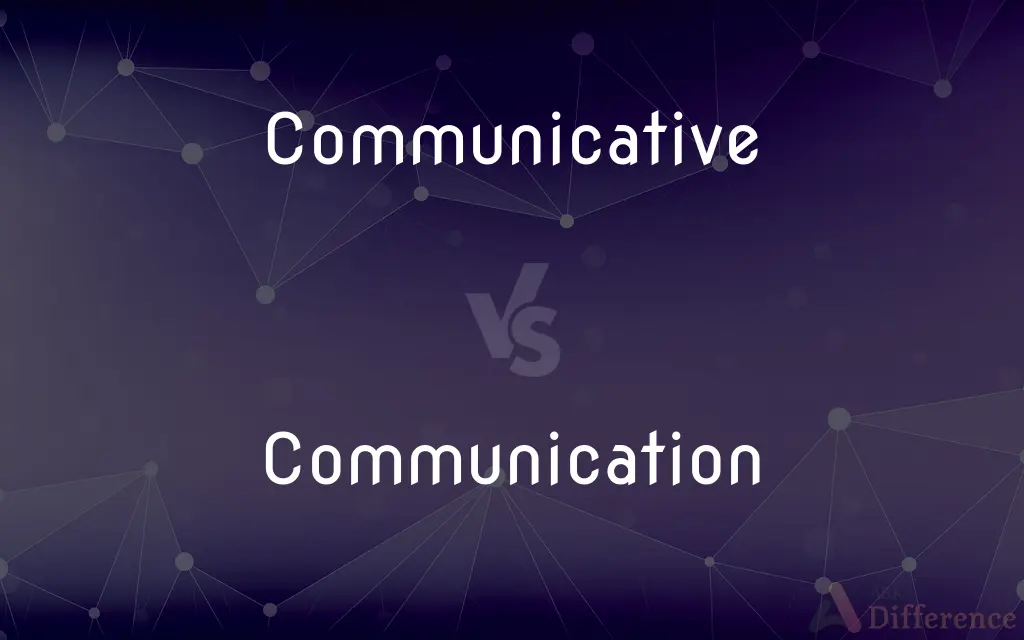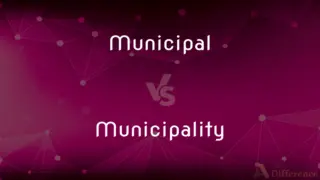Communicative vs. Communication — What's the Difference?
By Maham Liaqat & Urooj Arif — Updated on April 4, 2024
Communicative focuses on the ability or desire to convey information or ideas, while communication refers to the process of exchanging information or ideas between individuals or groups.

Difference Between Communicative and Communication
Table of Contents
ADVERTISEMENT
Key Differences
Communicative is an adjective describing someone's ability or willingness to share thoughts, ideas, or feelings effectively. It's often used in the context of language learning, where being communicative means being able to express oneself clearly and understandably. On the other hand, communication is a noun that encompasses the act of transmitting information, thoughts, and feelings. This process can occur through various channels, including spoken or written language, non-verbal cues, and digital platforms.
In educational settings, a communicative approach to teaching focuses on interactive speaking and listening activities that simulate real-life situations. This method prioritizes functional language use over grammatical accuracy, aiming to develop practical communication skills. Conversely, communication studies explore the theory and practice of sharing information effectively across different mediums and contexts, including interpersonal, group, and mass communication.
Being communicative implies a personal skill or trait that enhances one's ability to engage in meaningful interactions. It suggests an openness to dialogue and an efficiency in conveying messages. In contrast, communication as a concept or process does not imply any inherent qualities of the individuals involved but rather focuses on the mechanisms and effectiveness of the exchange itself.
Technological advancements have significantly impacted how we understand and evaluate communicativeness and communication. The rise of digital communication tools has expanded the ways in which individuals can be communicative, offering new platforms and formats for expression. Meanwhile, the study of communication has broadened to include digital literacy and the impact of technology on how we share and interpret information.
In a professional context, being highly communicative is often seen as a valuable soft skill, correlating with leadership abilities and team cohesion. It encompasses not just the transmission of ideas but also the capacity to listen and adapt to feedback. Conversely, effective communication within a team or organization is critical for achieving goals, managing conflicts, and building relationships. It requires clear policies, channels, and practices to ensure that information flows smoothly and efficiently.
ADVERTISEMENT
Comparison Chart
Definition
Pertaining to the ability or inclination to communicate.
The act or process of exchanging information or ideas.
Context
Individual trait or capability.
A broad process involving two or more parties.
Key Focus
Expressiveness and clarity in conveying messages.
The mechanisms and effectiveness of information exchange.
Educational Application
Emphasizes interactive and practical language use.
Encompasses theories and models of effective sharing.
Professional Value
Seen as a valuable soft skill enhancing teamwork.
Essential for goal achievement and relationship building.
Compare with Definitions
Communicative
Open and willing to talk or interact.
A communicative child is more likely to engage in classroom activities.
Communication
The study of how people exchange ideas and information.
She majored in communication at the university.
Communicative
Pertaining to the use of communication technologies.
She's communicative across various digital platforms.
Communication
The process of sharing information between people.
Effective communication is crucial for project success.
Communicative
Characterized by the exchange of thoughts and information.
The meeting was highly communicative, with active participation.
Communication
Strategies and practices for effective information exchange.
The company is improving its internal communication processes.
Communicative
Focused on expression and interaction in language learning.
The course takes a communicative approach to teaching English.
Communication
The use of signals or messages to convey information.
Non-verbal communication can be as powerful as words.
Communicative
Able to convey ideas clearly and effectively.
He's very communicative, always sharing insights with the team.
Communication
The tools and platforms for exchanging information.
Modern communication technologies have transformed how we interact.
Communicative
Inclined to communicate readily; talkative.
Communication
Communication (from Latin communicare, meaning "to share"or "to be in relation with") is "an apparent answer to the painful divisions between self and other, private and public, and inner thought and outer word." As this definition indicates, communication is difficult to define in a consistent manner, because it is commonly used to refer to a wide range of different behaviors (broadly: "the transfer of information"), or to limit what can be included in the category of communication (for example, requiring a "conscious intent" to persuade). John Peters argues the difficulty of defining communication emerges from the fact that communication is both a universal phenomena (because everyone communicates), and a specific discipline of institutional academic study.One possible definition of communication is the act of developing meaning among entities or groups through the use of sufficiently mutually understood signs, symbols, and semiotic conventions.
Communicative
Of or relating to communication.
Communication
The act of communicating; transmission.
Communicative
Eager to communicate; talkative.
Communication
The exchange of thoughts, messages, or information, as by speech, signals, writing, or behavior.
Communicative
Inclined to communicate; ready to impart to others.
Determine, for the future, to be less communicative.
Communication
Interpersonal rapport.
Communicative
Of or relating to communication;
Communicative arts
Communication
The art and technique of using words effectively to impart information or ideas.
Communicative
Able or tending to communicate;
Was a communicative person and quickly told all she knew
Communication
The field of study concerned with the transmission of information by various means, such as print or broadcasting.
Communication
Any of various professions involved with the transmission of information, such as advertising, broadcasting, or journalism.
Communication
Something communicated; a message.
Communication
A system, such as mail, telephone, or television, for sending and receiving messages.
Communication
A network of routes for sending messages and transporting troops and supplies.
Communication
Communications The technology employed in transmitting messages.
Communication
(Biology) The transfer of information from one molecule, cell, or organism to another, as by chemical or electrical signals or by behaviors.
Communication
An opening or connecting passage between two structures.
Communication
A joining or connecting of solid fibrous structures, such as tendons and nerves.
Communication
The act or fact of communicating anything; transmission.
Communication of smallpox
Communication of a secret
Communication
(uncountable) The concept or state of exchanging data or information between entities.
Some say that communication is a necessary prerequisite for sentience; others say that it is a result thereof.
The node had established communication with the network, but had as yet sent no data.
Communication
A message; the essential data transferred in an act of communication.
Surveillance was accomplished by means of intercepting the spies' communications.
Communication
The body of all data transferred to one or both parties during an act of communication.
The subpoena required that the company document their communication with the plaintiff.
Communication
An instance of information transfer; a conversation or discourse.
The professors' communications consisted of lively discussions via email.
Communication
A passageway or opening between two locations; connection.
A round archway at the far end of the hallway provided communication to the main chamber.
Communication
(anatomy) A connection between two tissues, organs, or cavities.
Communication
(obsolete) Association; company.
Communication
Participation in Holy Communion.
Communication
(rhetoric) A trope by which a speaker assumes that his hearer is a partner in his sentiments, and says "we" instead of "I" or "you".
Communication
The act or fact of communicating; as, communication of smallpox; communication of a secret.
Communication
Intercourse by words, letters, or messages; interchange of thoughts or opinions, by conference or other means; conference; correspondence.
Argument . . . and friendly communication.
Communication
Association; company.
Evil communications corrupt good manners.
Communication
Means of communicating; means of passing from place to place; a connecting passage; connection.
The Euxine Sea is conveniently situated for trade, by the communication it has both with Asia and Europe.
Communication
That which is communicated or imparted; intelligence; news; a verbal or written message.
Communication
Participation in the Lord's supper.
Communication
A trope, by which a speaker assumes that his hearer is a partner in his sentiments, and says we, instead of I or you.
Communication
The activity of communicating; the activity of conveying information;
They could not act without official communication from Moscow
Communication
Something that is communicated by or to or between people or groups
Communication
A connection allowing access between persons or places;
How many lines of communication can there be among four people?
A secret passageway provided communication between the two rooms
Common Curiosities
Why is being communicative important in a professional setting?
Being communicative fosters clearer understanding, better teamwork, and more effective problem-solving in professional environments.
How do communicative skills contribute to effective communication?
Communicative skills, such as clarity and empathy, enhance the effectiveness of communication by ensuring messages are understood as intended.
How does technology affect communicative behavior and communication?
Technology provides new platforms for being communicative and has expanded the scope and methods of communication, introducing digital literacy as a key skill.
What role does communication play in education?
Communication in education facilitates learning, teaching, and the constructive exchange of ideas between students and educators.
What distinguishes communicative from communication?
Communicative refers to an individual's ability or tendency to share thoughts clearly, whereas communication is the process of exchanging information between parties.
Can poor communication skills affect someone's ability to be communicative?
Poor communication skills can hinder one's ability to be effectively communicative, as they may not be able to express their thoughts clearly.
How does culture influence communicative behavior and communication?
Culture shapes communication styles, preferences, and interpretations, affecting both how individuals express themselves and how messages are received.
How do misunderstandings arise in communication?
Misunderstandings in communication can arise from unclear messaging, assumptions, cultural differences, and misinterpretation of non-verbal cues.
Can someone be communicative but still struggle with communication?
Yes, a person might be open and willing to share (communicative) but may struggle with effective communication due to barriers like language proficiency or anxiety.
Is digital communication changing the meaning of being communicative?
Digital communication is broadening the meaning of being communicative, including proficiency in digital platforms as part of the skill set.
How can individuals improve their communicative skills?
Individuals can improve their communicative skills through practice, feedback, active listening, and adapting to their audience.
What challenges do organizations face in enhancing communication?
Organizations may struggle with diverse communication styles, technological barriers, and ensuring clear, consistent messaging across departments.
Why is the communicative approach popular in language teaching?
The communicative approach is popular because it focuses on functional use of language, preparing students for real-life interactions.
What is the importance of non-verbal cues in communication?
Non-verbal cues play a crucial role in communication, conveying emotions and intentions that supplement or contrast with verbal messages.
What measures can be taken to ensure effective communication in teams?
Measures include establishing clear communication channels, promoting openness and feedback, and ensuring all members have the necessary skills and resources.
Share Your Discovery

Previous Comparison
Municipal vs. Municipality
Next Comparison
High vs. HiAuthor Spotlight
Written by
Maham LiaqatCo-written by
Urooj ArifUrooj is a skilled content writer at Ask Difference, known for her exceptional ability to simplify complex topics into engaging and informative content. With a passion for research and a flair for clear, concise writing, she consistently delivers articles that resonate with our diverse audience.














































